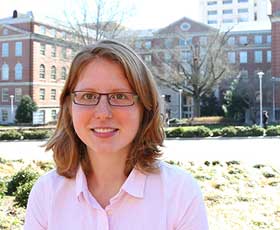Scaling A Great Wall: A profile of Lindsay Jaacks

The air pollution in China was so horrifying that UNC School of Medicine graduate student Lindsay Jaacks had to wear a mask when she took to the streets of Beijing. She also decided to pursue a new line of research – the effects of pollution on food and, as a result, the complex dietary effects on type 1 diabetes.
Birthdate: June 30, 1988
Hometown: Watertown, N.Y.
Education: Dual BS. Biological sciences, nutritional sciences, Cornell University, 2010; PhD nutritional epidemiology, UNC. Expected 2014
Awards: NC TraCS $2,000 Pilot Award; $150,000 Global Nutrition Scholar Grant, Sanofi
Mentor: Elizabeth Mayer-Davis, PhD, professor and chair, nutrition
Goal: Conduct the first study of diet in people with type 1 diabetes in a developing country
Extracurriculars: Bird watching, running, and volunteering: UNC Global Nutrition Council, UNC World Food Day Committee, Obama for America, and the Durham People’s Alliance.
History:
Lindsay Jaacks has loved science since grade school; it was just a matter of deciding which branch she’d pursue. She conducted undergraduate research in a plant pathology lab, but then became more interested in nutrition biochemistry. As soon as she landed her own funding to do nutrition research, she realized she had found her calling.
Why the Mayer-Davis lab?
When she came to UNC, Jaacks was drawn to the work of Elizabeth Mayer-Davis, PhD, a nationally recognized expert on nutrition and its effect on diabetes. Jaacks recalled being willing to do just about any project if it meant she would have the opportunity to learn from Mayer-Davis.
Why study diabetes in China?
After presenting at an international scientific meeting, Jaacks chatted with the president of the Chinese Diabetes Society, who was interested in working together to compile data on the dietary habits of people with type-1 diabetes in China. At that point, no one had ever gathered such information in China or any other developing nation.
“Because it’s such a populous country, the absolute number of people with type-1 diabetes is greater in China than in the U.S., but [the percentage of people] with the disease is actually among the lowest in the world. We don’t actually know why it’s lower – it could be genetic factors or dietary factors. It’s hard to say because we still don’t understand what triggers type 1 diabetes.”
Her research:
With a $2K pilot award from NC TraCS Institute at UNC, Jaacks was able to jumpstart her dissertation project, spending five months in China collecting blood samples and dietary surveys from 100 people with type 1 diabetes. Her pilot work led to a larger $150K award from Sanofi, a pharmaceutical company that provided further support for data collection and enabled Jaacks to finish analyzing her data and publish her results.
Jaacks was surprised to discover a stigma attached to having type 1diabetes in China, which meant she had to modify her studies by conducting the majority of food surveys and patient interviews over the phone rather than in person. Her research also uncovered a number of interesting findings.
“Over half of the participants did not eat fruit because they had been told that it was very bad for their diabetes. Overall, we saw that there was more of what I would call an ‘old-school’ management of diabetes, with patients on a very rigid diet where they eat the same thing at the same time every day. That is in contrast to the United States, where patients have access to ready supplies of insulin that they can take before a meal so they can eat more of what they want.”
Living in China:
When Jaacks moved to China, the country was in the midst of an air pollution scare, which clouded both her own experience abroad as well as her ability to advise patients on how to make healthy choices to manage their disease.
“I stayed inside most of the time, and if I had to go outside on days when it was particularly bad I made sure to wear a mask. That was the biggest thing, personally. I couldn’t run like I wanted to run, and I was hesitant to eat certain vegetables because they could be tainted with pollutants. There are all these recommendations you give people with diabetes – eat lots of vegetables, get out and exercise – but this advice is confounded in Beijing and many cities in China because of air pollution.”
The future:
When Jaacks finishes her dissertation, she plans to shift gears toward studying environmental pollutants and how they interact with diet to affect health outcomes.
“It isn’t just what food we are eating that’s changing, but also how we grow that food. We need to improve our understanding of non-nutrient food exposures – pesticides, herbicides, fungicides – that may be partially responsible for the obesity and diabetes epidemics seen around the world. Interventions that improve agricultural practices and reduce exposure to these chemicals will not only improve human health, but also environmental health.
“I don’t think I would have been interested in studying the interactions between environmental and human health if I hadn’t experienced the air pollution in China, which is just indescribable. Recently, my project manager emailed me to say her daughter had just pointed at the sky and said, ‘The sky is yellow!’ – a disturbing contrast to the blue skies we enjoy here in the United States.”
- Created on .